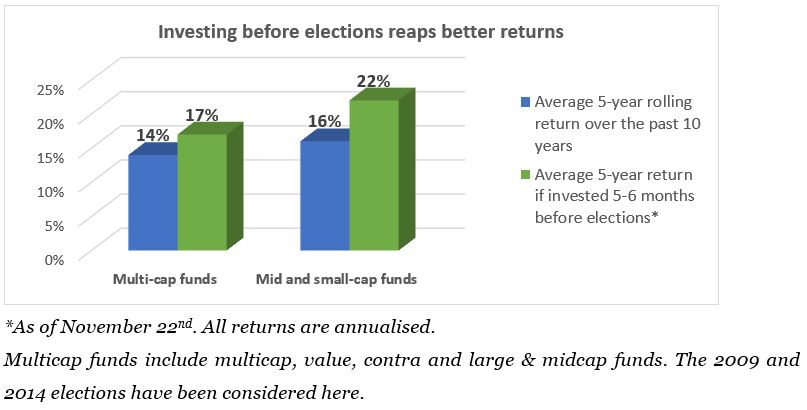Many of you fear market volatility or market reactions to the elections. This is not surprising. Political stability would be a clear positive for the markets, while a government change would be met with wariness until there’s more clarity on policies.
But remember also that markets react to events ahead of time. The best time to be investing is when there is information asymmetry – when there is limited information about or no clear picture of the future. As and when clarity emerges, markets assimilate that information and reflect it in terms of movement.
Therefore, waiting until elections are done with will leave you missing out on capitalising on the uncertainty.
Gain from pre-election volatility
Consider the past decade, which has seen two election cycles. In this period, the average 5-year returns work out to a good 14%. A minimum holding period of 5 years is what we recommend for equity funds.
But if you had invested around six months prior to the elections (i.e. around the November preceding the elections), your returns would have been higher. The same holds true for mid-cap and small-cap funds as well, as shown below.

The higher returns prior to the elections are the result of market volatility. The run-up to the elections has enough news flow about potential government policies, expectations abound over continuity of the government.
Markets will react to all of this, even if a new government doesn’t actually spell doom for the economy. Foreign institutional investors also tend to withdraw, book profits, or turn cautious as political stability is a factor they consider. Investing prior to the elections allows you to take advantage of this volatility.
It’s also not just a one-time investment that worked. Stepping up SIP amount in the six months before elections also added a kicker to your overall yield. For instance, say you ran an SIP of Rs 10,000 from January 2008 to January 2013, a five-year period. Your investment would have grown to Rs 7.58 lakh at the end of the SIP period. If you had added a third of your SIP to your regular SIP investment for six months before the 2009 elections, your corpus would have grown to Rs 7.98 lakh instead. A similar story plays out in the next 2013 election cycle as well.
Yes, this in a way amounts to timing your investments. But looking at market trends before and after elections tells us a few things, as we’ve written about earlier. For one, there is no clear post-election trend that would support waiting for results to play out. Two, where rallies have occurred, it has been before the election results and not after, causing you to lose out if you do wait.
Therefore, use the pre-election market jitters as a positive instead of waiting for waters to calm.








